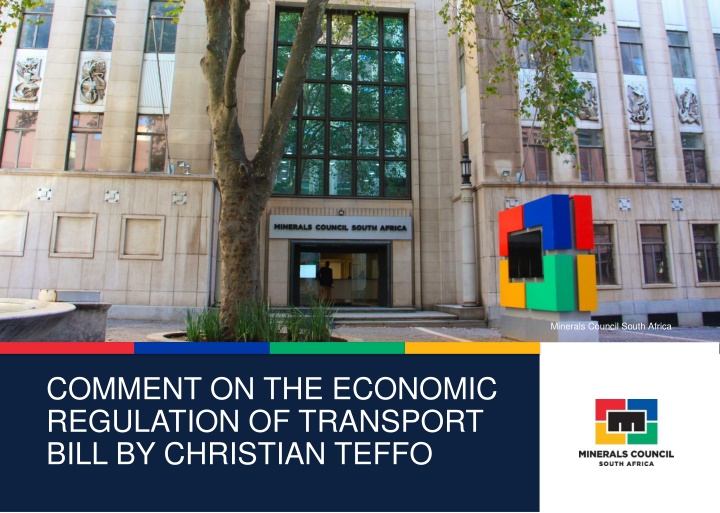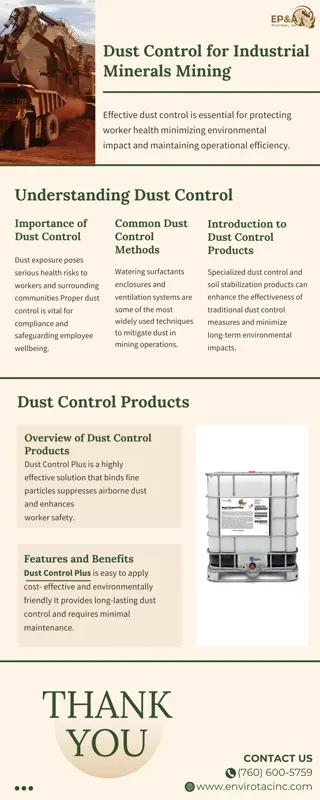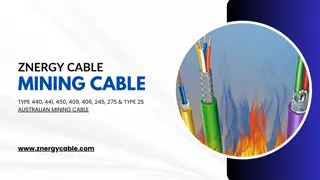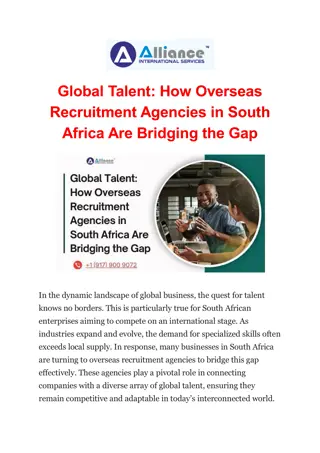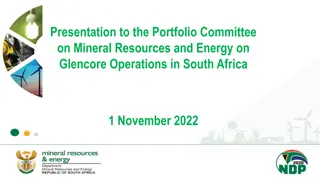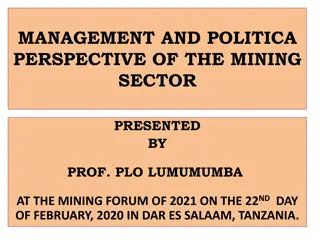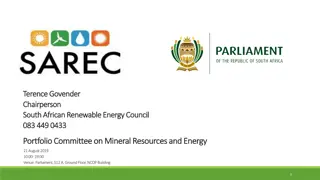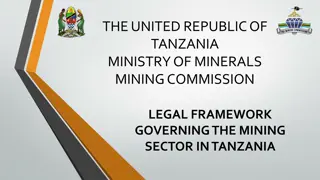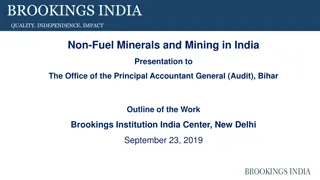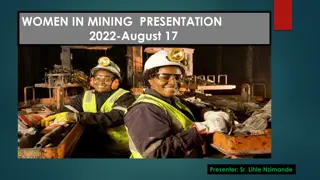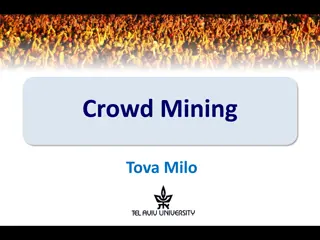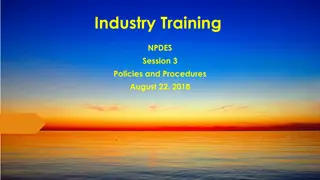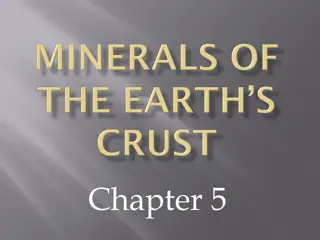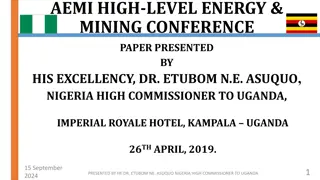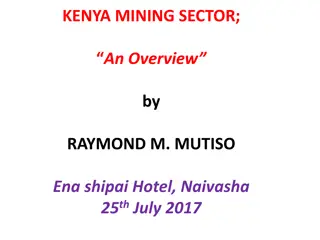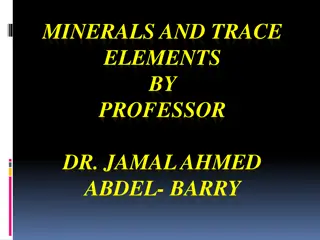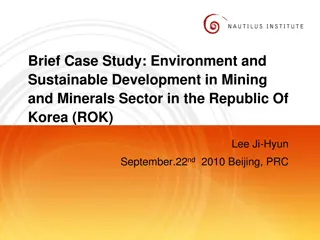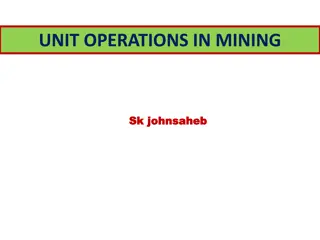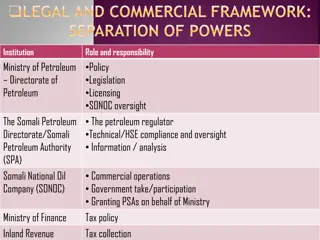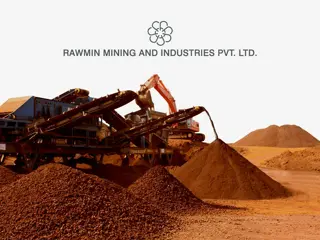Minerals Council South Africa - Supporting and Promoting the Mining Industry
Mining industry employers organization focusing on supporting, promoting, and representing the South African mining industry. Provides strategic support, advisory input, and advocates on behalf of its members. Offers services in safety, health, economics, and employment relations to advance the industry.
Uploaded on Jul 22, 2024 | 8 Views
Download Presentation

Please find below an Image/Link to download the presentation.
The content on the website is provided AS IS for your information and personal use only. It may not be sold, licensed, or shared on other websites without obtaining consent from the author.If you encounter any issues during the download, it is possible that the publisher has removed the file from their server.
You are allowed to download the files provided on this website for personal or commercial use, subject to the condition that they are used lawfully. All files are the property of their respective owners.
The content on the website is provided AS IS for your information and personal use only. It may not be sold, licensed, or shared on other websites without obtaining consent from the author.
E N D
Presentation Transcript
Minerals Council South Africa COMMENT ON THE ECONOMIC REGULATION OF TRANSPORT BILL BY CHRISTIAN TEFFO 1
Who we are and what we do We are a mining industry employers organisation that supports and promotes the South African mining industry. We serve our members and promote their interests by providing strategic support and advisory input. We facilitate interaction among members to examine policy issues and other matters of mutual concern to crystallise and define desirable industry standpoints. We act as a principal advocate to government, to state-owned enterprises, communicating major policies endorsed by our members. We represent the industry internationally. In some sectors, we undertake collective bargaining with organised labour on behalf of members. Page 2
Our members The Minerals Council represents more than 70 large, medium-sized and small and emerging miners, as well as three associations that collectively represent more than 200 entities. These members make up around 90% of South Africa s mineral production by value. Page 3
Page 4
Our brief history The Minerals Council has undergone a number of name changes in its history necessitated by mining and political developments in South Africa. 1968- May 2018 1889- 1896 1897- 1901 1902- 1952 1953- 1967 2018 ONWARDS 1887 1889 Page 5
Minerals Council at work The Minerals Council continuously looks for ways to advance the position of and make improvements in the South African mining industry and participates in various initiatives and projects in areas relating to health, education, policy and regulations. Safety, Modernisation and Sustainability The Safety, Modernisation and Sustainability team actively promotes safety and health in the workplace for mineworkers and has identified areas in which the organisation can initiate positive change. Health The Health team provides service excellence to members in the field of occupational health, including occupational medicine and occupational hygiene and ventilation, as well as advocacy and advice on TB, HIV and AIDS. Our key departments: Economics The Economics team provides input on matters affecting investment in the South African mining industry and issues facing the mining industry which have an economic impact. MOSH (mining industry occupational safety and health) The MOSH Learning Hub was established by the Minerals Council in 2009 to encourage and enable mining companies to learn from the safety and health expertise and leading practices that exist in the industry. Employment Relations The Employment Relations team provides service excellence to members in the field of labour relations, including labour market issues, collective bargaining, employment equity and social security. Page 6
Minerals Council at work, cont'd Public Affairs and Transformation + Stakeholder and Communications The Minerals Council s Public Affairs and Transformation team includes Stakeholder and Communications, and seeks to engage and inform all mining industry stakeholders through multi-channel communications and networking systems. Environment The Environmental team is charged with ensuring environmental issues are addressed in a manner that enhances members contributions to sustainable development and ensures that risks to the viability of the mining industry are identified and managed. Legal The Legal team provides the legal advice necessary to act on behalf of members in influencing legislative and other measures affecting members interests. The focus is on constructive policies that are consistent with the national interest. Finance and Administration The Finance and Administration team provides the internal financial and administrative structures and support to ensure the smooth running of the Minerals Council s internal processes. Illegal mining The Illegal Mining team assists in addressing challenges from a range of perspectives with the rise of illegal mining in South Africa. Junior and Emerging Miner s Desk The Minerals Council s Junior Emerging Miners Desk provides advice and support, and acts as a resource centre for the smaller Minerals Council member companies. Skills Development The Skills Development team facilitates an environment that enables the mining industry to deliver skilled and trainable employees for deployment and advancement. Page 7
Our strategy Page 8
CONSULTATIONS The Minerals Council welcomes the opportunity to comment on the Economic Regulation for Transport Bill which has been long awaited. We have previously commented into the bill, the process has been inclusive and goes back more than 10 years Page 9
Mining sector: Share of intermediate input costs to total costs Mining sector: Top five input costs items (%, 2017) Total costs = R574.8 bn (includes value added items) 14 R70.7bn 12.3 12 10 26% Compensation of employees (R151.5 bn) 8 Mostly administered costs 6 4.4 4.3 4 3.4 3.2 2 0 Transport and storage Financial services Electricity Retail Petroleum Page 10
HOW DOES THE BILL AFFECT US The minerals industry uses rail, road and our ports to deliver their products to customers Transport cost to mining is about 12.3% of total costs(R 70 billion) Transnet Freight Rail transported about 226 Mt of ore in 2018 There is limited rail and port capacity which results in the use of road and international ports which increases costs Road carries a cost premium of over 25% from rail Page 11
HOW DOES THE BILL AFFECT US(MANGANESE) 5.5 million tons of manganese was transported from the northern cape on rail to port Elizabeth and some of it on the road. The rail and port capacity could be upgraded to reduce reliance on road In 2019 the cost of transporting manganese increased by 8.15 % which is significantly above the national producer inflation of 4,7 % For instance manganese largest input cost is transport at 34% of the total input cost Over the last decade the cost of logistics have doubled for manganese Page 12
HOW DOES THE BILL AFFECT US(Coal) In terms of rail the minerals industry transports about 70 million tons of coal on The Transnet Freight Rail Coal Line to the Richards Bay Port About 60 Million Tons of coal is transported on the road to coal power stations in Gauteng and Mpumalanga The Mining Industry through the DoT is implementing RTMS and the use of Performance Based System trucks to improve safety on the roads and improve efficiencies. Page 13
HOW DOES THE BILL AFFECT US (Chrome) 17 Million tons of chromite and ferrochrome is transported mainly on road and some on rail from Limpopo and the North West to our ports It is imperative for South African transport to be economic and to allow South African minerals industry to be able to compete with their counterparts like Australia which is closer to the customers Page 14
HOW DOES THE BILL AFFECT US (Iron Ore) The minerals industry transports over 60 million tons of iron ore on the iron ore line to Saldhana port whilst the other 10 million tons is transported on roads Other rocks like granite are also transported on rail and road It is imperative for South African transport to be economic in order for our minerals industry to be able to compete with their counterparts like Australia which is closer to the customers Page 15
PARLIAMENTARY PORTOFOLIO COMMITTEE COMMENT CLAUSE COMMENT WORDING PROPOSAL CHAPTER 2 This clause will enable customers of old branch-lines which have been left in a condition of deterioration to be able to negotiate with the infrastructure owner to rehabilitate these facilities in return for offtake capacity. It also allows for new capacity or extension which is supported by the Minerals Council No changes required ACCESS TO RAIL INFRASTRUCTURE Types of access requests and access fees 6.(1).Requests to make investments in order to increase the capacity of infrastructure that has been determined in terms of section 4, where the owner of the said infrastructure has declined to make the requested investment to the requested specifications. Page 16
PARLIAMENTARY PORTOFOLIO COMMITTEE COMMENT CLAUSE COMMENT WORDING PROPOSAL Requests for and consideration of access approval by Regulator This enables a fair resolution in case the access seeker does not agree with some of the contract conditions set by the infrastructure owner. This will greatly assist in ensuring that contracts are competitive and enable South African companies to deliver products that can compete globally and locally. The Minerals Council supports this clause. No changes required 8. (1) Before approaching the Regulator, an access seeker must first try to negotiate the terms of the access agreement with an infrastructure owner in good faith. (2) If the parties fail to reach an agreement, either party can refer the matter to the Regulator for resolution. (3) When considering the matter referred to the Regulator in terms of subsection (2), the Regulator must invite the infrastructure owner and the access seeker to make written representations to the Regulator, within such period as the Regulator may determine. Page 17
PARLIAMENTARY PORTOFOLIO COMMITTEE COMMENT CLAUSE COMMENT WORDING PROPOSAL (5) When determining whether there is available capacity in the infrastructure or There might be infrastructure that has not been used for some time but might offer competitivity to sectors including farming and mining. The hope is that this clause does not exclude this infrastructure from being approved for use(due to requests of recent use), rehabilitated and used sustainably. It is thus requested that a sentence/bullet allowing for the use/approval of such infrastructure to be added. What comes to mind is the branch- lines that have not been used and might be used economically also supporting government strategies of moving some cargo away from roads and onto rail. iii. Where there is no record of previous use due to ownership changes the company should be allowed to estimate their volumes facility, the Regulator must (a) request written representations from all entities that are currently using the infrastructure or facility (i) detailing the recent history of utilisation of the infrastructure or facility, and the projected volumes for the ensuing year, and (ii) substantiating the said projections, where possible, with written evidence. Page 18
PARLIAMENTARY PORTOFOLIO COMMITTEE COMMENT CLAUSE COMMENT WORDING PROPOSAL 8.(6) The infrastructure owner must provide the Regulator with an updated report of Is the regulator going to have an overseeing capacity to ensure that the above maintenance and investments are carried out? This has been a major downfall for our State-Owned Enterprises over the past 10 years. The Regulator should be able to hold the infrastructure owner accountable for the above clause requirements being carried out. This might also necessitate the collaboration with the Safety Regulator. f. the regulator is to be properly staffed to ensure that they are able to fully consider the reports and make assessment of whether they operating within the parameters prescribed. capacity, including (a) maintenance downtime requirements; (b) technical specifications; (c) route schematics; (d) investment plans on the route; and (e) any other information that the Regulator may need to assess capacity. Page 19
PARLIAMENTARY PORTOFOLIO COMMITTEE COMMENT CLAUSE COMMENT WORDING PROPOSAL 8.(7) The Regulator may reassign unused capacity if there is no reasonable prospect of the current user needing that capacity, and if doing so will improve system efficiency. There have been instances where rail capacity has been taken away from mining companies for the benefit of newcomers/smaller companies. Enablement of new entrants and smaller companies is supported by the Minerals Council but should not be at the peril of existing companies that are contributing positively to SA. Instead we should aim at increasing the capacity to empower all customers and grow the economy. No changes required Page 20
PARLIAMENTARY PORTOFOLIO COMMITTEE COMMENT CLAUSE COMMENT WORDING PROPOSAL Decision on access approval In terms of point 8.(4)This might cause unintended consequences as the financing of the infrastructure might depend on it first being licensed or approved by the Regulator. The banks would be hesitant to finance infrastructure that has not been approved or licensed yet. Remove the clause (4) 9(2) The Regulator may grant access approval, even if the requirements of section (4) The Regulator may grant access to the access seeker contemplated in subsection (2), only once the new infrastructure or facility is built. Page 21
PARLIAMENTARY PORTOFOLIO COMMITTEE COMMENT CLAUSE COMMENT WORDING PROPOSAL CHAPTER 3 ECONOMIC REGULATION OF TRANSPORT FACILITIES AND SERVICES Our SOEs are ridden with high employee costs, high capital costs, fraudulent activities and generally inefficiencies as has been exposed in the past 2 years. It is thus of high importance to ensure that the regulator has got teeth with regards to dealing with regulation 11(4). A simple example is the issue of Eskom where capital projects(Medupi and Kusile Power Station) prices moved from R60 billion at inception to more than R 200 billion actual per power station resulting in excessive debt which has to be financed by the customers. Various research reports have also shown that the same state-owned enterprise is overstaffed by more than 30%. Such results in efficiencies being removed and customers use other means resulting in a death spiral for the service provider. For electricity we have the multi-year price determination which has not worked in any efficiencies into calculation of revenues which has resulted in price escalation of over 500% in the past years and currently Eskom have outstanding RCA collections of over R110 billion from its customers which if implemented will add an additional 50% to the cost of electricity. No Changes Required PART A PRICE REGULATION 11.(1)(2)(3)(4) When considering a proposal submitted in terms of this section, the Regulator must (a) consult with interested parties and the public in the prescribed manner; (b) determine whether the proposal is fair and reasonable, after considering all relevant circumstances, including (i) the regulated entity s operating efficiency and effectiveness; (ii) the need for investment and security of supply in the regulated market; (iii) the opportunity cost of capital including the average rate of return on other domestic or international facilities or services having similar or comparable risk; (iv) the actual or forecast cost of debt; Page 22
PARLIAMENTARY PORTOFOLIO COMMITTEE COMMENT CLAUSE COMMENT WORDING PROPOSAL The Multi Year Price Determination Methodology formula allows for the above as indicated by success with courts to ever-turn regulator decisions. the regulator thus has an important function to ensure that methodology used to calculate revenues for the service providers are properly investigated and are suitable for our market. The regulator should also ensure that they receive relevant data from the service providers, the regulator should also be properly staffed to decipher the information supplied and be able to take decisions that will be implemented by the service provider. The cost of transport and its efficiency can lead to our companies being able to compete with international companies which are mostly close to their customers. It is thus critical for the South African transport industry to be as efficient as possible to keep their current contracts and grow their market share as we are heavily endowed with products that come out of the earth. Page 23
PARLIAMENTARY PORTOFOLIO COMMITTEE COMMENT CLAUSE COMMENT WORDING PROPOSAL Part B It is of high importance for the regulator to have periodic reports from regulated service providers to ensure that the Regulator is aware of any changes to the approved revenue streams or capacities that are supposed to be moved for that year. It is also of high importance to ensure that the regulator is properly staffed to decipher such information. The regulator should be able to implement fines if the information is not forwarded by the regulated entities. An addition of periodic reports and imposing fines if such information is not supplied should be added to this clause to ensure that the Regulator has some power with regards to the supply of information. Economic Oversight of Regulated Entities Information from regulated entities 13. (1) Each regulated entity must submit to the Regulator, in the prescribed manner and form Page 24
PARLIAMENTARY PORTOFOLIO COMMITTEE COMMENT CLAUSE COMMENT WORDING PROPOSAL Regulatory accounting and disclosure requirements It is of high importance for the regulator to have periodic financial reports from regulated service providers to ensure that the Regulator is aware of any changes to the approved revenue streams for that year and to make any other related decisions or to conduct studies. It is also of high importance to ensure that the regulator is properly staffed to decipher such information. The regulator should be able to implement fines if the information is not forwarded by the regulated entities. An addition of imposing fines if such information is not supplied should be added to this clause to ensure that the Regulator has some power with regards to the supply of information. 14(1)(2)(3)(4) It is of high importance for the regulator to have periodic reports from regulated service providers to ensure that the Regulator is aware of any changes to the approved revenue streams or capacities that are supposed to be moved for that year. It is also of high importance to ensure that the regulator is properly staffed to decipher such information. The regulator should be able to implement fines if the information is not forwarded by the regulated entities. An addition of periodic reports and imposing fines if such information is not supplied should be added to this clause to ensure that the Regulator has some power with regards to the supply of information. Page 25
PARLIAMENTARY PORTOFOLIO COMMITTEE COMMENT CLAUSE COMMENT WORDING PROPOSAL 15. Complaints against regulated entities and 16. Direct referrals to Council The Minerals Council supports these regulations as they offer dispute resolution No changes required Page 26
PARLIAMENTARY PORTOFOLIO COMMITTEE COMMENT CLAUSE COMMENT WORDING PROPOSAL 29(1)(2)(3)(4)Establishment of Transport Economic Regulator The importance of an independent Regulator that is also impartial cannot be overstated to ensure that the decisions taken are based on sound technical information and policies that have been set and approved by government. This clause empowers the Board to make decisions which is supported by the Minerals Council. No changes required Page 27
CONCLUSION THE MINERALS COUNCIL SUPPORTS THE ECONOMIC REGULATION OF TRANSPORT BILL AND LOOKS FORWARD TO ITS IMPLEMENTATION Page 28
